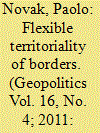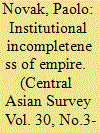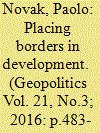|
|
|
Sort Order |
|
|
|
Items / Page
|
|
|
|
|
|
|
| Srl | Item |
| 1 |
ID:
108904


|
|
|
|
|
| Publication |
2011.
|
| Summary/Abstract |
To what extent do boundaries shape state-centred scales of discourse and action? In an attempt to answer this question, the article delves into one of the key ambiguities characterising boundaries: their being both static markers of sovereign jurisdictions and socially produced and reproduced institutions. Drawing on Foucauldian notions of 'productive power', and taking as a referent the Durand Line, the paper elaborates upon Robert Sack's contribution, and proposes an analytical framework that simultaneously captures, while maintaining distinct, two dimensions of territoriality: territoriality as a strategy operating in a socially emptiable space, and territoriality as it unfolds in its actuality. It argues that such framework provides insights on the multi-scalar and place-specific power relations that define the social context in which the Durand Line unfolds, offering important tools for the assessment of boundaries' role in the reproduction of society's contradictions and inequalities. The flexible territoriality of the Durand Line is defined by its simultaneous, and more or less successful, attempt at ordering space across multiple dimensions .
|
|
|
|
|
|
|
|
|
|
|
|
|
|
|
|
| 2 |
ID:
107540


|
|
|
|
|
| Publication |
2011.
|
| Summary/Abstract |
Afghanistan's territory and populations have long been crucial nodes for the assertion of regional and global projects of domination. In order to gain analytical insight into the identity and dispositions of such projects, the paper studies one significant episode of intervention over Afghan populations: the three-decade long protection and assistance practices in support of Afghan refugees in Pakistan. The paper has three objectives. First, it highlights the enabling aspects of Afghan refugee movement, that is, as constitutive and generative of complex politico-institutional orders and of social hierarchies, at a variety of scales. Second, it locates the analytical understanding of such orders and hierarchies within academic narratives that postulate a relation between refugee interventions and imperial politico-institutional orders. Third, it challenges some of the analytical tenets of such narratives by foregrounding the incompleteness and overlap of such institutional orders. On these bases, the article offers a nuanced and contextualized understanding of 'imperial order' as a form of rule that is premised on the continuous attempt to establish hierarchies out of a context of institutional disorder.
|
|
|
|
|
|
|
|
|
|
|
|
|
|
|
|
| 3 |
ID:
147284


|
|
|
|
|
| Summary/Abstract |
Development is inextricably related to the state-centred cartography of world spaces defined by borders, both in its historical trajectory and contemporary entanglements. Yet the multiplicity of channels and directions characterising their articulation are scarcely explored. This article contributes to this emerging field of enquiry. It delineates the essential traits of the borders and development nexus by establishing a systematic dialogue between the fields of Border Studies and Development Studies, a dialogue framed by concerns with scalar politics. More specifically, the paper places borders in development in two ways. First, it places borders in Development Studies: it identifies borders as a useful analytical vantage point that lay at the intersection between state- and non-state centred geographies of development. Second, it places Border Studies in development: focusing on the tension between borders and bordering processes, it interrogates economic growth- and poverty-related policies. Three contributions to the study of development arising from placing borders in development in this way are highlighted. The paper also expands the emerging field of enquiry concerned with the relation between borders and development, by considering development policies not yet been examined through the prism of borders, and by emphasising the hierarchical and yet unpredictable nature of the borders and development articulation. At its broadest, the discussion dis-entangles the multiplicity of scales and directions in which borders, bordering and the development process intersect. It is at this scalar intersection that the force of development, and the potentials for engaging, opposing, avoiding, or subverting it, lay.
|
|
|
|
|
|
|
|
|
|
|
|
|
|
|
|
|
|
|
|
|